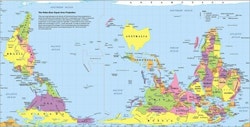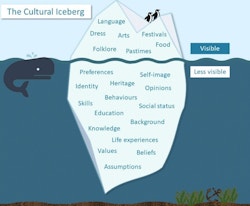Cross-border Careers Launchpad
Intercultural knowledge
Intercultural knowledge starts with culture-reflexive understanding, i.e., recognising how your own background influences the way you think, speak, and behave. Beyond that, it encompasses grasping social dynamics, understanding how people from different cultures see themselves, and acquiring both general and specific insights into cultures around the globe.
The resources on this page will deepen your self-awareness of your cultural perspective and equip you with practical strategies for learning about your colleagues’ cultural frameworks and the context of your future workplace. This dual focus - knowing yourself and exploring others - is a crucial first step toward building a successful global career.
Resource B1: Your social identity
An important part of developing intercultural competence is becoming aware of your own social identity, i.e. the different aspects of who you are that shape how you see the world and how the world sees you. These aspects can include your race, gender, nationality, religion, language, age, socioeconomic background, education, and more.
Your social identity plays a powerful role in:
- How you perceive yourself and your place in the world.
- How you interpret others' behaviours and intentions.
- How others perceive and interact with you, often based on assumptions, biases, or cultural expectations.
In intercultural settings, being aware of these dynamics helps you better understand the complexities of communication and relationships across differences. It encourages empathy, self-reflection, and the ability to navigate unfamiliar cultural environments with sensitivity and openness.
Activity: The social identity wheel
Use this handout to critically consider your social identities and reflect on how they shape and inform your life. First, review the information on social identity groups, then answer the five questions and fill out the wheel.
Template | Social identity wheel
After completing the wheel, take a moment to reflect:
- Which aspects of your identity do you think influence your interactions in cross-cultural contexts?
- Have you experienced situations where certain parts of your identity were misunderstood or highlighted?
- How might greater awareness of your own identity help you better connect with people from different backgrounds?
Source: Adapted for use by the Program on Intergroup Relations and the Spectrum Center, University of Michigan, 2020. URL: https://sites.lsa.umich.edu/equitable-teaching/social-identity-wheel/, accessed on 20.05.2025
Copyright: Adapted from Ticket, Module 3, a resource created by the TICKET Consortium as part of the TICKET Training Programme and licensed under a CC BY-SA 4.0 license.
Resource B2: Reflecting perspectives
Take any situation, we never have the whole picture, we only have one or some perspectives that we understand is the whole view. When we reflect our perspectives, we keep in mind that there are more approaches than those that we might have in mind, that there are many 'truths' and realities in their own respect. Reflecting perspectives means keeping in mind different cultural orientations and values but also numerous other perspectives that we cannot anticipate.
Activity: The world upside down
- Have a look at the map below. Search for the country you were born in. Was this more difficult for you than usual? Why is that? Describe the perspective that you see.
- What could you do to acquaint yourself with the unfamiliar view and make it a more familiar perspective? Note down three such strategies.

Copyright: This resource is licensed under a CC BY-SA 4.0 license as part of the EduBox course “Intercultural Communication – Online Modules” (Version 2.0. Hamburg Open Online University HOOU) on the Glocal Campus Jena.
Resource C3: Dig deeper into your host country
When preparing to go abroad, you can not only look up information on practical matters like accommodation but also on the prevalent culture of your host country. But what to look out for? Here, the iceberg analogy of culture, developed by Edward Hall, comes in handy: If we envisage the culture of a society like an iceberg, then some aspects are visible above the water, but a larger portion remains hidden beneath the surface.
The external, or conscious, part of culture is what we can see. This is the tip of the iceberg and includes behaviours and some beliefs. This part of visible culture is learned explicitly, easily changed and consists of objective knowledge. The internal, or subconscious, part of culture is below the surface of a society and includes some beliefs and the values and thought patterns that underlie behaviour. This invisible part of culture is learned implicitly, is difficult to change and consists of subjective knowledge.

Activity: Exploring the iceberg of culture
- Do some quick research about cultural aspects of your work abroad destination.
- Afterwards, pick at least one element of the visible culture of your host country that you find shocking or uncomfortable. It could be, for instance, a behavioural trait.
- Why is it shocking/uncomfortable to you, is it because of your own cultural background? Is it shocking to other people?
- Does it reflect a deeper cultural value of your host country?
When researching work abroad destinations, it is much easier to find examples of the outer more visible layers than it is to find the more hidden layer of values and beliefs. Therefore, here is a list of questions you can ask yourself when planning your cultural undertaking:
- Should I expect differences in what is thought of as appropriate 'personal space'?
- Should I anticipate differences in the way my counterparts use touch?
- Should I avoid any particular gestures?
- Should I expect differences in the level of acceptable eye contact?
- Do I know what body language is taboo?
- Should I anticipate different attitudes about the acceptability of asking personal questions?
- Should I anticipate different attitudes towards the acceptability of humour and emotions?
- Should I anticipate different attitudes towards the acceptability of interrupting?
- Do I know what type of argument is likely to be most persuasive?
- Should I anticipate a different attitude towards addressing difficult issues directly?
- Do I know what style of feedback is acceptable?
- Should I anticipate different expectations about the expression of criticism?
- Should I anticipate different expectations about the expression of anger?
- Should I anticipate different expectations about the formality of feedback?
- Do I know the range of ways in which disagreement is likely to be expressed?
- Should I expect a different style of conflict resolution?
- Should I anticipate different expectations about the use of silence?
- Should I anticipate different communication styles to be in use?
- Do I know when to use first names and surnames?
- Do I know what professional titles to use?
- Should I anticipate different attitudes towards small-talk?
- Should I anticipate different attitudes towards the importance of saving face?
- Should I anticipate a different use of tone or pitch when speaking?
- Should I expect different attitudes towards displays of affection?
Copyright: Adapted from the Cultural Awareness Capsule, a resource created by the DIGIPASS Consortium as part of the DIGIPASS Student Training Programme and licensed under a CC BY-SA 4.0 license.
